#platonism
Text
Magic System Pt. I - Necromacy & Incantation
Magic is a word that can encompass many disciplines, from a variety of origins and natures, operating by the will of the gods, or in their spite. In this case, of these closely related ancient practices, it's the latter.
Necromancy is the temporary reintegration of a person's spirit to speak with them, with the purpose of divination. It is also connected to the practice of reanimation, which has the goal of bringing back the dead, whilst Incantation is the process of imbuing the Form or essence of an abstract concept into an object to grant it a magical effect or property, called an enchantment.
While these disciplines seem very distinct from one another, they're connected by method and nature, as is to be seen.
Introduction
Cosmology, the makeup and structure of the universe, is an important factor in how these arts work.

An illustration of the celestial spheres, showing the Earth (🜨), the Moon (☾), the Sun (🜚︎), the Planets, the Zodiac, as well as the star Nebyrum (✶) and the Monad (☉︎)
Existence is divided between the World of Ideas (also known as the Hyperuranion or the Pleroma) and the physical universe (also known as the phenomenal world or the Kenoma). The World of Ideas is the heavenly abode of Forms, emanating from the One, divided into the lower Forms of physical objects and the higher, abstract Forms, that represent concepts, whilst the world of matter is divided between the earth and the heavens, a nested set of spheres moved by aether. The Pleroma and Kenoma are kept separate by the great barrier of the Horus, whose only gate is the star Nebyrum, in the constellation of Libra.
This is innately connected with the human essence, which carries in itself three "ambassadors" of each realm, which produce consciousness when joined as one:
the Spirit (represented by Mercury, which represents the Mind and the Ego, and inhabits the World of Ideas)
the Soul (represented by Sulfur, which represents the Heart and the Superego, and inhabits the Celestial Spheres)
the Pneuma (represented by Salt, which represents the Body and the Id, and inhabits the Underworld)
Death occurs when these thirds separate, the essence decomposes, and these portions sink and dissolve in the rivers of Hades, rise and settle among the stars, or begin their long and arduous journey through transcendence. The human essence, thus, becomes spread between worlds, and it's this setup that allows necromancy to be possible.
The main exploit through which necromancy and its related disciplines function is the alignment of these components, which makes them appear as joined to a distant observer looking down from the heavens (such as a god), leading to that person becoming whole again, coming back to life, albeit temporarily, in the form of a shade (due to the "body" being nothing but its pneuma, a living wind). It's worth mentioning that these alignments aren't always manmade; it can happen by chance, especially over bodies of water rich in pneumata, which is why areas like the Acheron will appear haunted with the shades of the dead.
Reanimation works similarly, but with a vessel that can be animated, instead of the bare pneuma. Though of course, it has its caveats: it can only last for as long as the alignment persists, in less than a day this vessel will die again. Moreover, either the original likely decomposed body must be used, or a whole other new one, either of which can be far too unsettling to be useful, though to some necromancers this isn't particularly a problem.
Incantation
Incantation, on the other hand, utilizes another exploit on top of that above. Usually, in the other forms of necromancy, a call is used, often the name of the deceased person, which can attract the soul and facilitate the alignment, but in the case of incantation, this is used with another intent: by writing a word the spirit can understand into an object and pouring the Acheron's waters into it, the spirit, within the World of Ideas, can "recall" its correspondent form.
Now, the World of Ideas is akin to the "backstage" of the universe. It contains every concept and all the lightwork that "projects" them into our world. The incantation process can be described as "throwing a wrench" into that mechanism. With enough luck, that spirit can "trip" in the right enough way that the "recalled" form will be "projected" into the vessel used, infusing that form into it. It's because of this that incantation is referred to as "heavenly vandalism" by those against it.
Procedure
The materials necessary for any kind of necromancy or its related practices is waters containing the pneumata of the dead. There a lot of sources for this across the world, though it's recommendable to source it from the area that the language used was spoken in, if applicable. The water should be transported by a hydria, or, if transported en masse, on many amphorae by ship or horse.
For simple necromancy, those waters are to be left to sit exposed to the sky and, specifically, the star Nebyrum, in Libra, which shows up in late spring and early summer. in case a specific person is being looked for, a common technique is to call their name, loud and repeatedly. The soul will seek the source of the sound and will make the chance of alignment easier.
The process is the same for any reanimation, but a vessel is needed, any dead body works, though the shade would probably prefer to be its own body, and bystanders would probably prefer a body that isn't rotting, but sometimes that can be unnecessary to consider. The water should be absorbed by the body in some capacity. Either fed or poured on. For more combat-specific applications, just spraying water on soil where the dead have been buried has proven to work.
And for enchanting, it gets different. It still uses a vessel, but this vessel should preferably be inert. A sword, armor, a gemstone, a piece of metal, anything could theoretically work. For most efficiency, it should be engraved -- first engraved with geometric patterns, those that would attract aether (the soul is made out of aether, it thus facilitates alignment), and then engraved with a word.
Spirits come in all kinds and origins, but most are from ancient times; after the Late Bronze Age collapse, the knowledge needed for transcendence into the Pleroma has been lost, so when enchanting that's a factor to be mindful of. Therefore, the word that is engraved on an object, that being the form that the spirit will recall, it needs to be understandable by them, so an ancient language from the region the pneuma was harvested from should be used. Since the most popular source for pneumata is the Acheron, Mycenean Greek is the most widely used language for enchantment. But ancient languages all across the Eastern Mediterranean are widely used.
An alternative method, long theorized to exist until confirmed by the discovery of the Proto-Indo-European magician groups in Pallas, is by repeatedly chanting that word in that language, which functions similarly to the call in other necromancy methods. In this case, the object just needs to be in contact with the water.
Success is a question of chance, as many random factors need to be right for the alignment to be possible, but in such a case the item will receive the properties of its assigned form. A sword enchanted with eternity may be impervious to wear, one with sharp be able to cut effortlessly through most materials, or one with burning could set its targets alight.
Alternative theories
While the mainstream theory is that the star Nebyrum is the gateway between the phenomenal and intelligible worlds, there are other schools of thought that differ from this cosmological standard.
Most popular in Nicomedian Greece and Palmyrene Egypt, is the interpretation that due to the non-spatiality of Forms, there is no single "gate" to their world, as it's not a "place" as we understand it. Therefore, the alignment of the omnipresent spirit -- and by extension the time of year for magical practice -- is irrelevant, only the soul and pneuma.
This school of thought, eventually, got extrapolated into its own form of religious cosmology, splitting off into its own sect. It posits that instead of a pneuma-soul-spirit trinity, there is only an earthly soul and a heavenly soul, who separate in death. The heavenly soul, in turn, is "conjoined" with the rational spirit, or is a vehicle (okhêma tês psukhês) that "bears" its seed, metaphorically compared with an expecting mother.
In this religious cosmology, influenced by Egyptian and Christian afterlife beliefs, Paradise is located in the Sphere of the Fixed Stars, and to reach it the soul must embark in a long and perilous journey across the Heavenly Spheres following death. In this view, the stars of the night sky are actually the distant lights of heavenly cities, which form kingdoms centered around one of fifteen stars, ruled by spirits, angels, or gods embodying some kind of quality that every human soul is aligned to in some capacity, and only upon reaching this paradise can the soul and spirit separate and the latter be integrated back into the One.
In practice, this sect assigns people their "root star" (radix sideris) and requires that star to be overhead in order to contact them after death, while in the areas of enchantment, it's also believed that the root star of the soul used for the process will influence how a form will "manifest" on an object. For instance, Algol, the star of bloodshed and violence, might benefit enchantments of war or twist other ones into lethality.
History
The origins of necromancy, incantation, and all other magia contra deos, is said to be during the Titanomachy, at the end of the Golden Age. When his usurpation became a certainty, Cronus taught the Pelasgians, inhabitants of Greece at the time, the ways of necromancy and enchantment, to sow the seeds of rebellion and impiety among the peoples that the next king and demiurge, Zeus, would rule.
During this time, the practice spread amongst Eastern Europe through trade, reaching the Cucuteni-Tripolye culture and the Proto-Indo-Europeans, until the Late Bronze Age collapse, where the Tyrsenians, or Teresh, one of the Sea Peoples, would spread enchanted weaponry across the Mediterranean through invasion before settling, along with Cronus the Veiled God, on Italy.
This is one of the founding myths of the Rasennan Mysteries, an underground cult in the former Etruria, led by an Etruscan-speaking society of magicians, that keep the old tongue alive as a liturgical language. The evidence does attest this, as copper axes with anomalous properties have been found across Eastern Europe, and from the existence of the Palladian cults, inside the petrified body of Pallas in the Carpathians, that are effectively a preserved society of Proto-Indo-European magicians.
Classical Age
Following the Late Bronze Age Collapse, the art of incantation and was eventually forgotten save for cults that kept the tradition going, but enchanted weapons and artifacts continued to propagate through the remaining trade routes, especially in Archaic Greece. Necromancy remained alive, especially in the Near East, most likely due to its simplicity.
It wouldn't be, however, until the development and spread of Platonism, and later Neoplatonism, through the Mediterranean that Incantation would be later rediscovered. It, with all other types of magic, remained a forbidden art, hidden in mystery cults until its first major application in 260 by the Palmyrene Kingdom, and later Empire, in its pushback against the Sassanids by troops clad in enchanted bronze armor and weapons.
Magic remained forbidden in the rest of the Roman world for decades. A legion remained stationed at Epirus on June to persecute any goetes travelling to the Acheron. However, this came at the cost of fewer winter to repel barbarian invasions, which contributed to the worsening Crisis of the Third Century. The practice was discontinued under Diocletian's dominion of the East. Enchanted weapons were imported from Palmyra at times, but enchanting on Greek soil remained shunned. It wasn't until the series of defeats in Thrace that the value of magical prohibition was put into question.
The Treaty of Salona, signed in 312, mandated that the magical arts are to be consulted in the face of absolute necessity for the survival of the state, and that enchanted equipment is to be provided by the Palmyrene Empire if existing legions can't handle barbarian incursions. Otherwise, incantations performed on Roman, Gallic, or Illyrian soil must be counteracted with equivalent sacrifice, and that it may not be performed by a citizen, but rather a prisoner or gladiator.
****************************************************
Alright, this is going to be one post of many where I try to go get around to explaining my magic system. I'm gonna be posting a lot of these little infodumps about my fantasy conworld, so if you want to have them all in one place rather than endlessly scrolling through the slop in my profile, just check the tag "\madeline\apotheosis.txt", that being the codename this project gets until I can think of something good. Also, these little Courier New sections are commentary. That's just how I format things.
****************************************************
#fantasy#worldbuilding#sandalpunk#mythology#roman mythology#greek mythology#text#fantasy worldbuilding#fantasy world#magic system#platonism#\madeline\apotheosis.txt
41 notes
·
View notes
Text
Ti Platonism
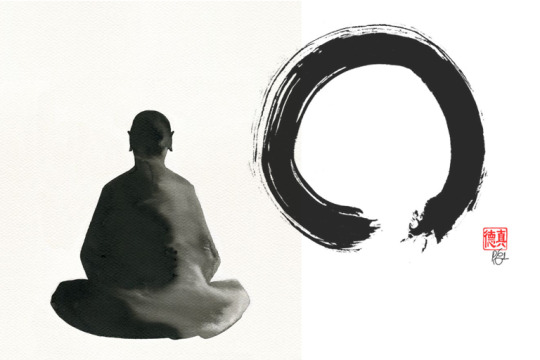
Search for Universal Axioms
While it might be said that all types seek truth of a sort, to the Ti user the quest for truth has a very specific meaning. He is not satisfied with the acquisition of information and indeed he generally avoids information, but is instead drawn to eternally narrow his search down to what he believes is the core of a thing - beyond the senses and beyond the confines of space or time. He'll aim to get rid of as much as is unnecessary, until only the essence remains. To him, truth means landing upon some elusive and singular convergent principle or nexus which gives formulation, symmetry and justification to everything else in the conscious universe. The Ti user, it may be said, is on a quest for a philosopher's stone. He will dig for it in all manner of philosophy and theories of the mind and this can cause them to become obsessive in their pursuits, and abandon all sense of context in their research. They may forget that they are not making tangible progress towards any scientific or objective aim, but instead are diving headlong into a conceptual challenge. Indeed it is an epistemological challenge with the bait of the One Truth at the end of it which they chase. And whether this truth is ever known by the Ti user is irrelevant to the visceral belief in its existence. Even if he has come to doubt all truth and has entered an existential dead end in his pursuit, so that he only knows that he knows almost nothing, he was lead into this territory by an inarticulated but deep rooted suspicion that something is there just waiting to be crystallized into knowledge.

Reductionism
For the Ti user the world is often seen as a place of incongruences and complexities; of paradoxes and mysteries. Everything is operating from unchecked assumptions on top of assumptions with no explanation given for why any such thing is to be believed. The world seems utterly chaotic and nonsensical, and this causes a great deal of stress especially as it relates to the pursuit of axiomatic truth. In order to alleviate this, Ti often executes a reductionist methodology wherein all unjustified things are negated, in an effort to eliminate all untruths and see what is left. Ti in its purest sense will not wish to adapt any form of knowledge or information if it does not understand its underlying formation. It will feel that if the starting premise within them is not correct, then the entire foundation is faulty and all else that can be built from it will be askew. It therefore obsesses over the accuracy of the first few blocks and cornerstones of its epistemology, forcing Ti often times into an infinite regression loop of doubt. If told "go to school" then may think "what is school" and from there proceed to ask "what is a degree?" and "what makes knowledge gained at a school desk more valid than what is self-taught?" This can be terribly frustrating to family members as it may appear that the Ti user is rationalizing his way out of responsibility, when in reality he is contending with the existential questions of meaning, value and purpose - which often must be addressed for them first before a single finger can be lifted towards a task. This can be problematic as Ti will tend to reduce social norms/ideas/things down to parts, without putting them back together. These thoughts will occupy the Ti user's mind continually and may cause things to lose their value as the process of reduction strips away all meaning. At its most extreme this can lead to to existential dilemmas and nihilism even when nothing in life would suggest a reason to be unhappy. As Ti is a subtractive process by nature, it acts as a diagnostic process that identifies misalignment in any system of premises. Hence it tends to be far better at identifying what things are not, than what things are. It is often up to the other functions to counterbalance Ti's influence and provide positive affirmation for reasons, motivations and purposes.

Castle Construction
However, if enough of a theoretical foundation has been set in the mind of the Ti user, then what emerges is a crystalline structure at the core of their being. Like the growth of an ice crystal from water, a theoretical castle begins to form. Each block of this castle is a premise or argument that helps structure the incoming information of reality in such a way as to create an interpretive scaffold. For Ti, this scaffold serves as a sort of Rubik's cube or kaleidoscope that allows the complexities of life to be viewed and understood from a convergent point. Should there ever be a mismatch between the reality outside of them and the kaleidoscope's prediction, the Ti user hurries to try to reformulate and refine their instrument (to fix the Rubik's cube), but an instrument they must use. The Ti user does not interface with reality directly, but does so through this instrument which acts as their proxy and go-between and allows them to make sense of things without needing necessarily to engage in the difficult task of materialism or empiricism. This leads inescapably to the formation of a personal theory, often beginning with phenomenology of the mind/consciousness. One such example of a crystalline theoretical structure is René Descartes' "cogito ergo sum" which, through his efforts and thoughts, was the cornerstone he came to develop and which helped him make sense of all other premises that cascade from this first axiom. But each Ti user may place a different conclusion as their starting premise. For some, the fundamental principle may be consciousness, for others it may be bodily experience, and for others it may be God or love.

Ontology & Linguistics
The Ti function is inherently philosophical in nature, producing in the Ti user a gravitation towards what we might call ontology. It becomes important to the Ti user to define what things are in and of themselves. In this sense, Ti seeks to describe reality absolutely and almost as though they were to vanish themselves from existence. It must be able to be true without them in the picture, otherwise it is not true. By this metric Ti seeks for a sort of timeless abstract definition for everything. The Ti user usually seeks to encapsulate the essence of a thing through semantic precision; meticulously working out where the boundaries lie between two adjacent thought groupings. There is little more satisfying to them than when data suddenly clicks into perfect arrangement, revealing a fundamental truth. The Ti user lives for these rare and magic moments of clarity and by engaging in this differentiation process, they gain a firm mental grasp on the world; dissipating the fog of the unknown. The further the Ti user is from clarity of definition in his own thoughts, the more internal dissonance will be felt. This can also make the Ti user a bit of a grammar nazi and their semantic proclivities can lead them to spend hours discussing starting terms without ever making headway related to the real-world problem in question. The Ti user may be highly stimulated by such a discourse even though the original point of the discussion has been left far in the past. More than a few Ti users thus take to linguistics for their proximity to philosophy and their capacity to organize the very structure of our knowledge paradigms.
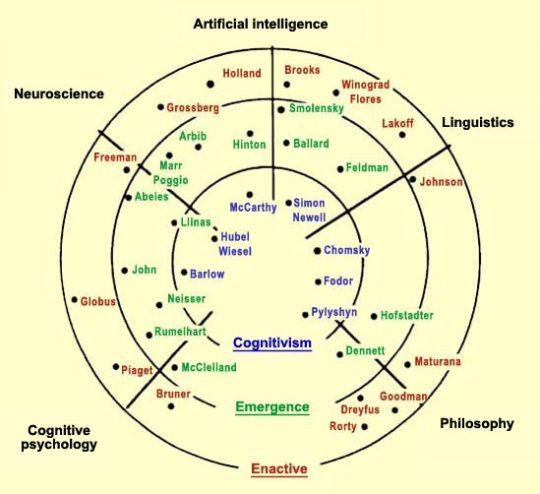
Perfectionism
Additionally, there is a perfectionist quality to the Ti user wherein their personal desire for purity of logos is at once a desire for purity of the self. Indeed, the Ti user's success in building this logic framework is tied to their sense of identity, as they may view themselves primarily as a truth-seeker and truth-speakers. There will be an ethical quality to their pursuit which manifests in a valuing of neutrality, honesty, authenticity and clarity. Lack of neutrality, honesty or lack of clarity will be sensed as a transgression; one which they avoid in their own behavior and which they may also depreciate in others. As a compass function, Ti will strive for a type of nobility of character which it can sustain only if it feels it is being honest with itself and avoiding as many impurities as possible in its own thinking. This high personal standard can cause the Ti user to become entirely mute as their ignorance forces them to retract any opinion or utterance that they cannot firmly stand behind. The strong Ti user may be a very silent presence at school or in the workforce, speaking only occasionally and after minutes or hours of reflection on what he wishes to say. If their logical devotion is towards an art project or creative endeavor, the same bottleneck may appear, causing them to hesitate in publishing any works until everything feels entirely perfect. They may feel their works are never quite precise enough and will spend countless hours in the refinement process - aiming always for their writings, paintings or manifestations to capture their thoughts and intentions with no compromise. This can lead to negative feelings and self-blame forming for mistakes made or inaccurate information given.

Stubborn Alignment to Framework
While the Ti user may not know many things, he will stand firm by what he does know. The Ti user can be stubborn and difficult to negotiate with if they have fixated on certain ideas they feel are true, and so long as their idea remains in their head, their heels remain sunk in that interpretation. This can lead them to become impractical in many real-world situations when the consequences of their carefully crafted definitions collide with certain necessary actions and obligations. They’ll often refuse to participate in something that seems necessary to some, but misaligned to them. And while no amount of pressure, external circumstance or logistical necessities can bend their opinion, a properly aimed rebuttal can radically shift their entire stance in moments. The Ti user's logical apparatus operates like a lock combination. When the right inputs (deductions) are received, suddenly the gates of their thoughts reconfigure and allow for a completely new mental trajectory to be possible and new actions to emerge from them. But without this reconfiguration, they may remain deadlocked in certain conclusions or philosophies even when those conclusions are negative and harmful to them. The strong Ti user must reason his way out of a certain conceptual hole and cannot simply ignore it or choose a more convenient path which doesn't fit into the structure and rules of their self-made castle.

-Behaviors Under Stress
Emotional Shutoff
When the stress and gravity of life cause a fall out of emotional health, the strong Ti user's already faint emotional energies become even more deeply coveted. Unable to operate meaningfully in the environment, they will flee fully from the world and into a protective barrier of their own making. They will shut off emotionally and may become suspicious and avoidant of intrusions to their private space. This can lead to a very isolated experience where they feel they can only rely on themselves to figure out the answers to emotional problems which it often treats as intellectual problems. Driven equally by feelings of self-sufficiency and fear of emotional openness, they will aim to shoulder their pain entirely alone.
They will meet the problem with callousness of feeling. What is not felt cannot hurt, and here their natural capacity for dispassion is repurposed and used to strip power away from the heart. They may sever their connection to others with surprising ease, and forget the magnitude of their inner affect. What is non-ideal is rejected as they continue their pursuit for the ideal both in themselves and others. Yet the content remains present but buried in the unconscious, and they may harbor unresolved feelings for years at a time – often freezing their heart in the process. Merciless as they may be, they will intellectualize their decisions, satisfying their need to act from just premises and retain a proper sense of self.
Wailings and charged emotional reactions may be perceived as irrational and therefore inappropriate and to be avoided. However, as stress accumulates further, their logic will become gradually more distorted as they aim to rationalize what is essentially an emotional objection underneath. Unable to clearly and cathartically convey their heart’s voice, having stripped it of its power, their inner pains will emerge through distorted logical arguments and skewed claims. Their tendency to intellectualize matters of the heart will lead them to push the narrative into a form that aligns with their repressed feelings. As their stress furthers, they may disconnect themselves from others entirely and fall into schizoid tendencies.

Hyper-Focus on Imperfections
In another scenario, if the Ti user's heart remains open, they meet the problem with honesty of feeling. In their pursuit for authenticity of self, they allow the full gravity of their situation to hit them and they familiarize themselves with their darkest disappointments, losses and despair. Because they are perfectionists by nature, they will turn their attention to themselves to understand what is wrong. They may come to feel responsible for all that is not going well in their life and will be prone to episodes of melancholy and deep ruminations about their shortcomings. Worse yet, if a conclusion emerges (“I’m horrible”, “I’m responsible”) that cannot be rationally refuted, be it true or not, they will need to continue believing it in order not to betray their compass, even if believing such a thing causes continual pain. Moving past certain damages can be challenging unless their paradigm changes to reinterpret their past in a way that puts them in a more merciful place. They will have trouble accepting positive emotions just for the sake of it, without cause to feel positive. They will feel dubious of any trajectory of healing that isn’t somehow also justified in a certain sense. In this way, they do themselves no service; holding onto their negative beliefs so adamantly can be the cause of their own demise.

#Cognitive Typology#Cognitive Functions#Introverted Thinking#Ti#INTP#ISTP#Behaviorism#Platonism#Search for Universal Axioms#Reductionism#Castle Construction#Ontology#Linguistics#Perfectionism#Stubborn Alignment to Framework#Emotional Shutoff#Hyper-Focus on Imperfections#Void
57 notes
·
View notes
Text
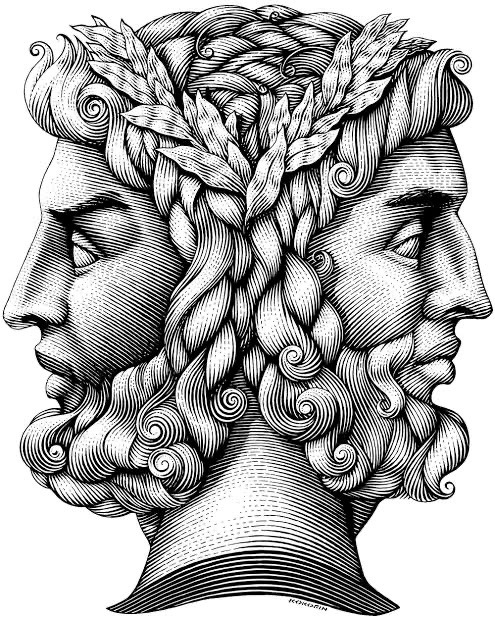
Without and Within
“For Plato the world is not only our sensation of it, as it must be if man is merely in the world. The world is also in man, so man can know from ‘within’ as well as from ‘without’. The Ideas behind all discernible reality are touched by man through the existence in him of innate notions.
These ‘innate notions’ in the soul of man have as their true object the Ideas which are the archetypes behind all temporal manifestation. So, while our knowledge is developed by worldly experience, it contains elements which are not derived from experience.
In its contact with the sensible world, which contains imperfect representations of the ‘eternal’ Ideas, the soul is awakened in greater or less degree to an awareness of the Ideas themselves. This awareness comes, not from the side of the senses, but internally, from the side of the mind. The soul recollects the Ideas through perceiving the manifold objects of nature into which the Ideas are reflected.
The soul stands between the sensible world and the world of Ideas – between two orders of ‘reality’; and becoming aware of this she takes from the world of sensible objects all those impressions which remind her of a higher order of reality, not giving to sensible nature that which does not belong to it, but extracting from it that which belongs to an order above it.
So her whole mode of experiencing temporal life and gaining impressions becomes quite different from the mode of experience belonging to the soul that is ‘glued to the senses’ and sees all as outside her, attributing the first causal principle to physical nature itself.
For the awakened soul all is really within. The real world is within, and is only apprehensible within. And a man whose soul has reached this position is no longer ‘natural’ or sensual man, although all that sense reveals to him is immeasurably intensified. He sees clearly – with increasing clearness – because he has become a meeting-point of two worlds, one reached within and through himself, and the other reached without, and through his senses.”
From “Living Time and the Integration of the Life” by Maurice Nicoll (1952).
40 notes
·
View notes
Text
Plato: “Physical objects are just inferior copies of ideas, which are the only things that are real and you can access them with your mind.”
Buddha: “Your mind isn’t real either.”
Plato: “Ughhh...”
10 notes
·
View notes
Text
Demiurgy and How a Confucian Passion for Learning Can be Considered As Such.
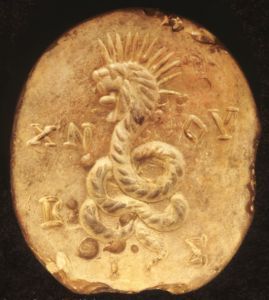
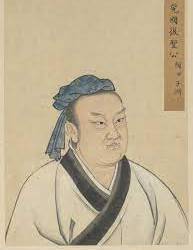
What is Demiurgy? As the author of Egyptian Mystic Polytheism so succinctly puts it:
Demiurgy is a type of “devotional act.” A devotional act is any activity outside of direct prayer with a religious purpose and significance. What makes “demiurgy” unique as a type of devotionalism is that it is principally concerned with the act of creation. Like theurgy, to mimic the gods and pursue likeness, one must participate in creativity as a lesser version of God’s creation. Producing, crafting, constructing, and creating are all acts that mimic the “Demiurge” or “Creator Deity.”
So, essentially, these are mundane activities that are performed with the intention to ritualize and devote said craft to the Demiurge, the Creator god of the Cosmos. As the quote above mentions, this is similar to theurgy in that these mundane activities help us mimic the Creator.
With that out of the way, lets take a look at Corpus Hermeticum XI.22, which I think supports such ritualized "demiurgy:
Mind is seen in the act of understanding, God in that act of making.
This sentence refers to God’s literal creation of All Things and how He is seen through His creation, as this whole preceding paragraph refutes the idea that God is entirely invisible and “unseen.” For context, here is the passage:
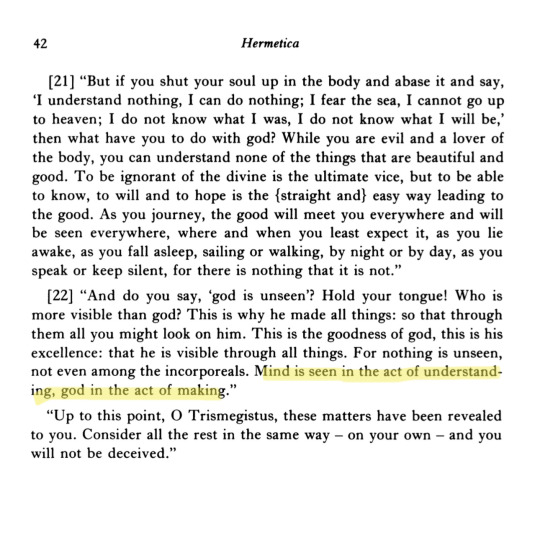
In Corpus Hermeticum V, we are told God is invisible and entirely visible. For us to understand God, we must become like Him (Corpus Hermeticum XI.20), as so much as that is possible, in each of our Fated predispositions. A way to do so is to create things ourselves through begetting, making music, writing, or exercising, i.e., our own Demiurgy. You can find a list here if the reader wants a more comprehensive list of things that can be considered a devotional act to the Demiurge -- Demiurgy. So essentially, if God is seen in His Creation, we too can see the Demiurge manifests itself via our lesser creations.
Also, possibly a Confucian passion for learning could be considered Demiurgy. Let me explain: To take this principle out of context and apply it to Hermetic thought, I'd like to talk about the Confucian disciple Yan Hui 顏回, who was unmatched in his genuine and effortless love of the Way and learning. In the Analects 6.3 we see a ruler inquiring to Confucius about a "disciple who loves learning":
There was one named Yan Hui who loved learning. He never misdirected his anger and never repeated a mistake twice. Unfortunately, he was fated to live a short life. Since he passed away, I have heard of no one who really loves learning.
Yan Hui is also praised for his love of learning in Analects 2.9 and 5.9. Generally speaking, in Confucian thought, learning, rites, and conforming to cultural adornments 文 do indeed change our native “stuff” 質, which Confucius thought contained inherent flaws that were corrected via rigorously conforming, yet also effortlessly loving social and cultural arts, rites and learning. So, if learning in and of itself can change us for the better; correct our inherent flaws, and make us more like God, then we should all try to emulate Yan Hui and his effortless love for learning because when we learn, we grow. According to Chapter 2 of Effortless Action: Wu-Wei as a Metaphorical Concept and Spiritual Ideal in Early China by Edward Slingerland, learning and instructions (and other things) are essential to constantly strive for and put effort into to abide by the Confucian Way. Learning and instruction change our inherent "stuffs" in a way that makes us effortlessly abide in the Way 道.
So, back to the Hermetica. In Corpus Hermeticum XI.20, we are told to:
“Make yourself grow to immeasurable immensity…”
Arguably, this can be done by a passion for learning (and, of course, many other things)— which cannot be taught but must be realized. And what do we see all throughout the Hermetica? A yearn for Gnosis. Gnosis differs from conventional knowledge, as gnosis is experienced rather than learned. Something that Edward Slingerland argues is the source of Confucius's frustration with the current age of the Zhou Dynasty in Analects 15.13:
I should just give up. I have yet to meet a person who loves ren 仁 as much as he loves the pleasures of the flesh.
Confucius is frustrated by the fact that you genuinely cannot teach a person ren 仁 or "humaneness." Whether we are talking about ren or gnosis (mind you, two completely different things), these things must be experienced and "recollected," as Edward Slingerland argues in Chapter 2. The idea that the gnosis of the gods, God, and the Demiurge is "recalled" is found in passages from Plato's Phaedo 73c-75e and other dialogues I have yet to read, such as the Phaedrus and Meno. Likewise, in Analects 7.30, Confucius exclaims:
Is ren really so far away? No sooner do I desire ren than it is here.
Recollection is also found in the Corpus Hermeticum IV.2:
The man became a spectator of God's work. He looked at it in astonishment and recognized its Maker.
Now that we have established that the Analects, Platonism, and Hermeticism are structured somewhat similarly, let's look at Corpus Hermeticum I.31, we read:
“Holy is God, who wishes to be known and is known by his own people…”
Corpus Hermeticum I.32:
“Grant my request not to fail in the knowledge (gnosis) that befits our essence.
This suggests that God wishes us to know Him as much as possible according to our inherent predispositions to gnosis. So what I’m getting at is that if we can realize and acquire a Confucian-style passion, such as Yan Hui, for learning, this can change us and make us become more like God. The love for learning. The yearning to know God and His creation and the sciences that we have developed to understand his creation is most certainly Demiurgy. We never stop learning, whether we continue education after high school or not.
So, now that we have established that learning can indeed change us and help us mimic and help us recognize God and the Demiurge's creation, here are some examples of how I use my love for learning (but this love cannot be compared to Yan Hui's) as Demiurgy:
Reading academic literature on my beliefs
Learning the mythologies of the Ancient Egyptian gods
Going to college to broaden my knowledge and to establish a career.
Learning about myself: both my corporeality (psychology/body/health) and my incorporeality (soul).
This list goes on and is certainly not limited to those few bullet points. But if it is not clear by now, learning helps us grow as individuals; learning allows us to better understand the world around us, from our own communities to other cultures around the world. Such a whole-hearted pursuit of learning can be considered Demiurgy because we are actively creating a better version of ourselves. Just as in my musings, I consider Demiurgy because I am creating writings that will go on to inform and help other people understand the topics I write about with an intention of devotion to the Demiurge. My active pursuit of learning also is Demiurgy because everything I learn is done in devotion to the Creator of a world I love so much, and He is ultimately responsible for the very things I choose to learn.
So, do you all think the yearn and love for learning in and of itself can be considered Demiurgy?
#hermeticism#confucianism#confucius#plato#platonism#neoplatonism#demiurge#demiurgy#philosophy#chinese philosophy#hermetic philosophy#learning#yan hui
7 notes
·
View notes
Text
Aleister Crowley says in his "Qabalah", "Now it is wrong to say that this idea of the unity of the divine spirit is identical with this idea of the muddle of chaos —unless in that exalted grade in which "The One is the Many"". Of course Crowley expects us to reject this idea that The One is the Many and instead accept the interpretation, attributed to "the compiler of Liber 777", that the "The One", the unity of the divine spirit", is "the Spirit of the Living God". But what if we were to say that The One is actually indeed the Many, and what if we were to accept that this also means that the totality of divine spirit is also what Crowley takes to be "the muddle of chaos"? A point of interest for me is the way that the totality of Platonism is not necessarily in agreement that The One Stands Above The Many. In fact, as Gregory Shaw notes, Plato's Parmenides holds that The One actually must be the Many, and this idea is also perhaps reflected in the philosophy of Damascius and Iamblichus in their affirmation of the One in its very multiplication rather than its separation from becoming and multiplication. So then, if we accept Crowley's meaning as this being chaos, then what might arise from this notion of The One? Something interesting, I bet.
11 notes
·
View notes
Text
Abstraction is a dark magical art. We're distilling materiality into ideality, reversing the work of Gods.
7 notes
·
View notes
Text
Cosmic Gods: Astral Piety, Astrolatry, ⁊ Astrotheology
Poor man, are you not satisfied with what you are seeing every day? Have you anything finer or greater to look at than the sun, the moon, the stars, the whole earth, the sea? And if you really understand Him that governs the universe, and bear Him about within you, do you yet yearn for bits of stone and a pretty rock?
– Epictetus, Diatribai, II, XVI (trans. W. A. Oldfather)
I was recently asked…

View On WordPress
4 notes
·
View notes
Text
In love, one and one are one.
Jean-Paul Sartre, Sayings.
#philosophy tumblr#philoblr#french writer#french philosophy#french literature#dark academia#writrblr#philosopher#jean paul sartre#metaphysics#love#oneness#platonism#life quotes
55 notes
·
View notes
Text
You mock and revile the statues of our gods; but if you had reviled Bacchus or Hercules in person, you would not perhaps have done so with impunity. But those who crucified your God when present among men, suffered nothing for it, either at the time or during the whole of their lives.
And what new thing has there happened since then to make us believe that he was not an impostor, but the Son of God? And forsooth, he who sent his Son with certain instructions for mankind, allowed him to be thus cruelly treated, and his instructions to perish with him, without ever during all this long time showing the slightest concern. What father was ever so inhuman? Perhaps, indeed, you may say that he suffered so much, because it was his wish to bear what came to him. But it is open to those whom you maliciously revile, to adopt the same language, and say that they wish to be reviled, and therefore they bear it with patience; for it is best to deal equally with both sides,—although these (gods) severely punish the scorner, so that he must either flee and hide himself, or be taken and perish.
— Celsus, The True Logos
#pagan#paganism#abrahamic religions#polytheism#apologetics#theology#christianity#quotes#celsus#platonism
7 notes
·
View notes
Text
Valentines day from an Arosbian Perspective
I think that one of the things I struggle with most being aro on valentines day is the gaslighty nature of it all. It has been made painstakingly clear from the beginning that this entire world (and capitalism, hello) is extremely amatonormative (and heteronormative) and valentines day is about that. But when you talk about how it feels bad to be alienated because youre single, you’re closeted, your partner is unable to celebrate for whatever reason etc etc its like “omg dont be so bitter go out with your parents or something”. This is so ridiculous. PLEASE direct me to the valentines hallmark cards about spending it wth your sister, be so forreal. Not to mention that maybe those people in your life have plans of their own?? Iono I dont hate love (lol) but come on. All month I’ve been trying to schedule Valentines specific stuff for myself and everything has been specifically for two people.
And when I try to talk to my partnered friends about it all they do is silently nod. (Most of my friends happen to be partnered Im not avoiding talking to single friends lol) its like they’re silently agreeing and don’t know what to say. How could they? Theyre participating in the system I’m complaining about. Its like I’m looking for an answer that I know they can’t give me. Cuffed people often say things like “just love yourself” or “its not worth it relationships are hard”. These are non-answers to me. I want to be told that it’ll be okay regardless. That, there’s no promise for a “true love” as we know it, and that not everyone who finds someone even has what you’re looking for, or ever will. You may find love, you may not, but its not a you problem and you will be alright either way. That, this world prioritizes people being paired off because thats the only way they know how to keep it going, and the partnered vs notpartnered binary really doesnt exist the way our language suggests. Ultimately, I want someone to tell me that I’m not broken, there’s nothing wrong with me. They never do, though. Again, how could they know?
The societal pressure to be with someone (majorly, a man) in order to elevate your worth is both crushing and humiliating. Its humiliating to want it, but its more humiliating to not have it. But its also bad to NOT want it, because that means somethings wrong with you, but most importantly, if noone wants you, thats the worst, because then theres REALLY something wrong with you. The marriage of this with being a lesbian eats away at me at all times. But again, if I talk about it, I simply “dont love myself enough”. I know I’m arospec, but I also know that I desire the experience of healthy, romantic love. I think it takes self love to know thyself. And though you should do your best to heal to be the best person you can for yourself and your partner-- I have always rejected the idea that love comes with prerequisites.
To wrap my feelings up (for now) I don’t think that I disagree that you should spread love however you can on this day (if you want to). I fully encourage people to celebrate their loved ones in the absense of romance. I think its great to spend that time “with your parents or something”. Just exhausted how year after year my lifelong experiences as a lesbian and an aro person are, in one day, boiled down to “just being bitter” lol
Im hashtagging this to hell, because I wonder if other people feel this way and would feel less alone if they saw it hahaha
Happy Valentine’s Day!!
(Sincerely)
#aro#aromantic#aromanticism#valentines day#asexual#aroace#aroacespec#amatonormativity#lesbian#sapphic#arosbian#happy valentine's day#lgbt#lgbtq#queer#qpr#queerplatonic#platonic#platonism#familial#romance#romantic#romanticism#loveless#romance repulsed#romance averse#romance positive#romance negative
20 notes
·
View notes
Text

“Wisdom falls into three divisions.
The first division is the science of nature, called in Arabic, "Al-Ilm al-tibi". This branch of knowledge deals with the essential and incidental properties of material bodies.
The second division consists of the practical sciences, called in Arabic, "Al-Ilm al-riazi. These comprise arithmetic, engineering, astronomy, and music.
The third division, called in Arabic, "Al-Ilm al-ilahi. is the science of theology, which deals with the knowledge of G-d, knowledge of His torah, and other spiritual things, such as the soul, the intellect, and spiritual beings.
All these divisions of wisdom, and their respective branches, are gates which the Creator has opened for men through which they may attain a comprehension of religion and of the world. Only that some sciences are more needed for religious matters while others are more needed for secular interests.
The sciences whose use is closest to worldly matters is the science of nature, which is the lowest science and the practical science, which is second. These two sciences instruct on all the secrets of the physical world, its uses and benefits, its industries and trades and is conducive to physical and material well-being.
The science which is most needed for religion is the highest science - Theology.
We are under duty to study it in order to understand and obtain a knowledge of our religion. But to study it in order to attain worldly benefits is forbidden. Our teachers said (Nedarim 62a): "[expounding the verse: to love the L-rd your G-d, to hearken to His voice, and to cleave to Him' [This means that one should not say, I will read Scripture that I may be called a scholar. I will study mishna, that 1 may be called Rabbi, I will study [Talmud, to be an Elder, and sit in the assembly of elders; but learn out of love, and honor will come in the end". And "Do [good] deeds for the sake of their Maker, and speak of them words of torah for their own sake. Make not of them a crown wherewith to magnify yourself, nor a spade to dig with" (ibid). And "Fortunate is the man that fears the L-ord, that delights greatly in His commandments' (Ps. 112:1),
R. Eleazar expounds thus: In His commandments' but not in the reward of His commandments. This is just what we have learnt. He used to say, Be not like servants who serve the master on the condition of receiving a reward; but be like servants who serve the master without the condition of receiving a reward." (Avodah Zara 19a).”
-Rabbeinu Behaye, Chovot HaLevavo.
#books#history#literature#religion#theology#mysticism#esotericism#religious#orthodox#Judaism#jewish#orthodox judaism#Jews#jewish theology#neoplatonism#platonism#perennialism#perennial philosophy#chabad#Hasidic#Reform Judaism#conservative judaism#philosophy#israel#Israelite#Torah#tanakh#jewish culture#culture#art
2 notes
·
View notes
Text
youtube
#youtube#notmine#let'stalkreligion#religion#mysticism#esotericism#esoteric#platonism#plotinus#neoplatonism#neoplatonic#philosophy#theology
2 notes
·
View notes
Text
The journey of the soul in embodiment.
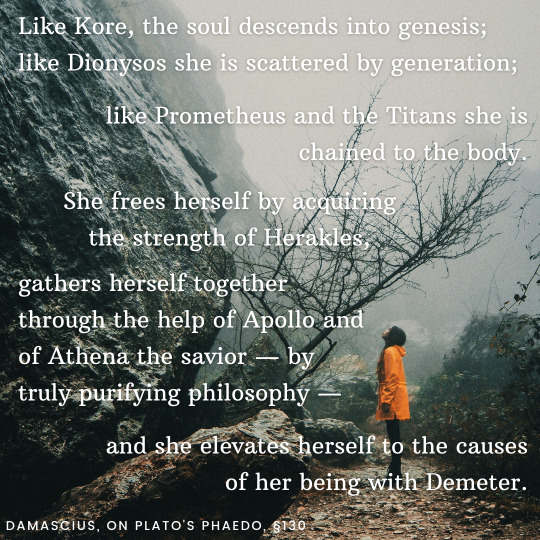
A woman stares up at a cliff and a leafless, scraggly tree. Text is from Damascius, on Plato's Phaedo, §130.
Like Kore, the soul descends into genesis; like Dionysos she is scattered by generation;
like Prometheus and the Titans she is chained to the body.
She frees herself by acquiring the strength of Herakles,
gathers herself together through the help of Apollo and of Athena the savior — by truly purifying philosophy —
and she elevates herself to the causes of her being with Demeter.
#these words are so so good to contemplate in prayer#polytheism#damascius#demeter#apollo#apollon#herakles#athena#athene#prometheus#titanic gods#dionysos#persephone#kore#platonism
17 notes
·
View notes
Text
I have been cooking on this since at least May. In this article I examine the theurgical metaphysics of the Syrian philosopher Iamblichus, via Gregory Shaw's paper on the subject, and use it to present a Pagan framework for the downward ascent of the Left Hand Path. As part of this we will explore ancient Platonist philosophy, magic, demonology, The Devil, Satanism, Buddhist hongaku doctrine, a little bit of accelerationism, a little bit of Hinduism, a little bit of Gnosticism, and the Fall.
#paganism#satanism#magic#occultism#theurgy#left hand path#iamblichus#platonism#satanic paganism#demonology
11 notes
·
View notes